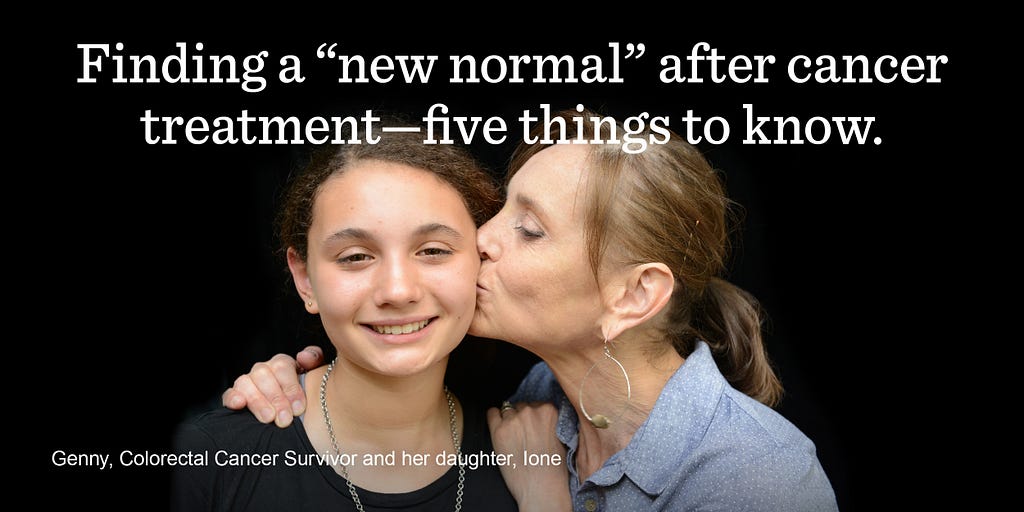Life After Cancer Treatment — 5 Things to Know

When you finish cancer treatment, your first instinct may be to jump back into your pre-cancer life as soon as possible. It’s important to know that your body and mind may have experienced a very difficult and life-changing event, and you may need to adjust to a “new normal.”
So what does a “new normal” life look like?
Here are 5 things to be aware of.
Cognitive Changes: Some cancers and treatment can result in cognitive changes that affect thinking, learning, processing or remembering information. These changes can affect aspects of daily life such as the ability to work or even do everyday tasks. These changes can happen suddenly or slowly over time. If you think you have cognitive challenges, click here. to see a checklist of symptoms. Talk to your health care team about any concerns you may have.
Your Emotions: After treatment is done, you may experience a mixture of emotions. This may be confusing and surprising, but it is normal. Feelings of gratitude, closeness to loved ones and a desire to get the most out of life are common, but so are feelings of anger and uncertainty. Will my cancer come back? Why did this happen to me? Did this cancer burden my family? In time, it generally becomes easier to deal with emotions as other life events may require more attention. However, if these feelings don’t subside, make sure to talk with your health care team or find a counselor or other emotional support.
Physical Effects: Cancer treatment affects each person’s body and physical functioning differently. If you’re experiencing pain post-treatment, make sure to notify your health care team as they can help with management. Pain can interfere with healing and you do not need to suffer in silence. Sexual health and body image can also be affected, and it’s important to know that cancer treatment can cause physical and emotional changes such as fatigue, discomfort and lack of confidence. If your fertility was compromised during treatment, there are resources such as Livestrong Fertility available to help with your family-building options.
Eating Well & Exercise: Studies have found that nutrition and physical activity have health benefits for cancer survivors. Eating a plant-based diet, keeping a trim fit, being physically active for 30 minutes or more every day and limiting red and processed meat, alcohol, tobacco and sugar are excellent ways to maintain a healthy lifestyle. Though you may feel weak and tired after treatment, many cancer survivors have said that physical activity helps them feel better. Being active may help you regain strength and positivity, and reduce stress, but it’s important to discuss this with your health care team to make sure a fitness regimen supports your ongoing healing.
Create a Survivorship Care Plan: Cancer care doesn’t necessarily end once treatment is done. Work with your medical care team to create a Survivorship Care Plan that includes: medical history records, summary of your diagnosis and treatment, information about possible late and/or side effects and signs of recurrence, a schedule for follow-up care, tips on cancer prevention and how to find quality support services. The American Society for Clinical Oncology offers free Treatment Summary and Survivorship Care Plan templates that you can use on your road to recovery.
Wherever you are in your cancer journey, LIVESTRONG provides free, confidential and personalized support to patients, caregivers and anyone affected by cancer. Visit Livestrong Navigation to get started.
Life After Cancer Treatment — 5 Things to Know was originally published in Livestrong Voices on Medium, where people are continuing the conversation by highlighting and responding to this story.